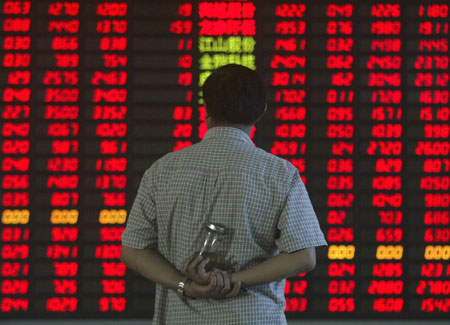Nod given to buying overseas shares
Updated: 2007-08-21 06:58
 A man stands in front of an electronic board at a stock exchange in Nanjing, East China's Jiangsu Province, August 20, 2007.[Reuters] |
Mainland residents will, for the first time, be allowed to directly invest in overseas securities under a pilot program to be launched in the northern port city of Tianjin.
Investors can use their foreign exchange or purchase foreign currency to open an account with Bank of China's Tianjin branch or Bank of China International Securities in Hong Kong, according to a statement on the State Administration of Foreign Exchange (SAFE) website yesterday.
The investment amount will not be subject to the annual limit of $50,000 for an individual to purchase foreign exchange, as per earlier rules.
"This is part of the process of China's capital account reform," Chen Jijun, analyst with Beijing-based CITIC Securities, told China Daily.
Stephen Green, senior economist with Standard Chartered Bank (China), described it as "a historic move in China's capital account opening".
SAFE said in the statement: "This is an important measure to widen the channels for foreign exchange outflows and promote basic balance in international payments."
Individuals were earlier allowed to invest overseas indirectly through banks, brokerages, insurers and fund managers through the qualified domestic institutional investors (QDII) scheme.
"Now, the new program will provide an alternative for domestic individuals eying overseas markets," Chen said.
Analysts said the Hong Kong market will be the first to benefit as many mainlanders are likely to buy stocks of mainland companies listed there.
"It is absolutely good news for the Hong Kong stock market," said Paul Lee, banking and insurance analyst at Hong Kong-based Taifook Securities.
"The policy will surely be welcomed by Hong Kong investors, because mainland investors' participation will help boost confidence as well as market sentiment," he told China Daily.
"After last week's market turmoil, this policy is timely support for Hong Kong."
The Hang Seng Index jumped 1208 points to close at 21595 yesterday, up 5.9 percent - the highest intraday rise in recent years.
Lee said the mainland will benefit too, as capital diverted from the A-share market will help "prevent over-heating" and "relieve pressure for the yuan to rise".
It is yet to be seen, however, whether the new policy will be well received by mainland investors, Chen said.
"The domestic market has remained strong despite the recent fluctuations and I'm not sure whether many investors would choose to invest abroad, at least for now."
Tianjin's Binhai New Area, chosen for the pilot program, is widely considered the country's third economic engine after Pudong in the Yangtze River Delta and Shenzhen in the Pearl River Delta.
|
||
|
|
|
||
|
||
|
|
|
|






